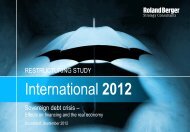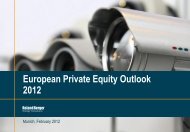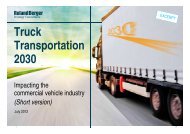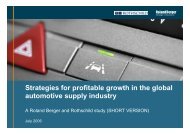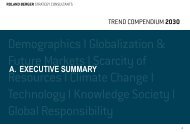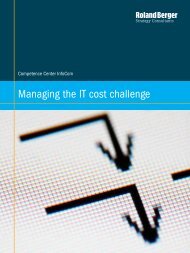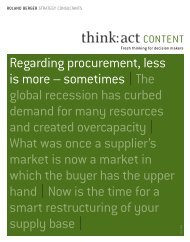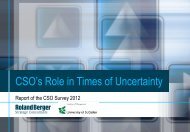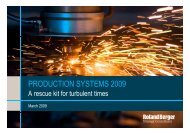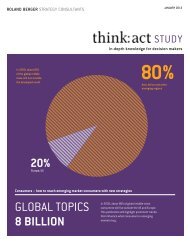issue 1 - Roland Berger
issue 1 - Roland Berger
issue 1 - Roland Berger
You also want an ePaper? Increase the reach of your titles
YUMPU automatically turns print PDFs into web optimized ePapers that Google loves.
The formula for growth DOSSIER #01<br />
According to v. Pierer, this type of code of conduct creates<br />
trust and a sense of confidence among both<br />
employees and customers.<br />
TRUST-BUILDING MEASURES designed to reinforce<br />
its own identity are also used by Tchibo Holding, based<br />
in Hamburg, Germany. Founded as a coffee roaster in<br />
1949, the retailer’s everyday goods and services division<br />
has experienced double-digit growth in the last<br />
four years. This division is currently responsible for 60<br />
percent of sales and 95 percent of earnings. This<br />
change could be seen as a cultural revolution that<br />
ended up presenting fundamental questions about the<br />
company’s purpose. Nonfood board member Stefan<br />
Swinka answered these questions after consulting<br />
closely with employees, whose expectations and feedback<br />
influenced the new mission statement. “You can<br />
no longer run a large company on authority alone,” says<br />
an obviously convinced Swinka. Instead, he explains,<br />
he relies on credibility, authenticity and openness—a<br />
sentiment with which the experts at <strong>Roland</strong> <strong>Berger</strong><br />
Strategy Consultants could not be in greater agreement.<br />
They discovered that companies that are strong on<br />
communications and have flat hierarchies are the most<br />
successful. These types of structures increase individual<br />
responsibility, permit faster decision-making and<br />
create more flexibility. In managing innovation and<br />
creativity, three- to five-year objectives are the most<br />
likely to lead to success. They should be ambitious<br />
because only then will they create the necessary pressure.<br />
At the same time, an incentive system in the form<br />
of salary scales, success-based bonuses or similar<br />
types of compensation should be put in place to demonstrate<br />
to employees that good performance is indeed<br />
worth the extra effort.<br />
THESE TYPES OF MECHANISMS also guard against<br />
some common, negative aspects of success, such as<br />
satiation, sluggishness and complacency. A prime<br />
example of a company almost strangled by its own<br />
growth is IBM. The undisputed market leader in mainframe<br />
computers in the 1980s, Big Blue almost missed<br />
the PC trend and was only saved by the smart turnaround<br />
management of its CEO Lou Gerstner, who took<br />
the helm in 1993. Developers had retreated into a realm<br />
of technological insider knowledge while failing to come<br />
up with marketable products. “A lot of people confuse<br />
invention with innovation,” warns Michael Zisman,<br />
»A model European company«<br />
A MARKET LEADERS’ RENDEZVOUS: ROLAND BERGER STRATEGY CONSULTANTS AWARDS<br />
PRIZES TO EIGHT GROWING FRENCH COMPANIES PURSUING EUROPE-WIDE EXPANSION.<br />
Bernard Bourigeaud, CEO, Atos Origin<br />
Atos Origin, France’s leading IT service<br />
provider, was created from the merger of<br />
Atos and Origin. Today, the group is a major<br />
European player, achieving sales of more<br />
than €5 billion, with 45,000 employees in<br />
50 countries.<br />
One of the most sought-after corporate awards in<br />
France, the Prix de l’Entreprise Européenne, was<br />
awarded in September. The competition was judged<br />
by <strong>Roland</strong> <strong>Berger</strong> Strategy Consultants, the HEC<br />
Management School and the economic magazine<br />
Enjeux-Les Echos and was subdivided into eight categories.<br />
“We want to promote what characterizes a<br />
European company and highlight the background of<br />
its market success,” explained Vincent Mercier, head<br />
of the Paris office and a member of <strong>Roland</strong> <strong>Berger</strong><br />
Strategy Consultants’ Executive Committee.<br />
Atos Origin, an IT service provider, won the grand<br />
prize in the “More than €3 billion in sales” category.<br />
The jury lauded the company for having<br />
smoothly sailed through the turmoil affecting the<br />
industry sector. Eurofins Scientific, a life science<br />
group, also received a grand prize, this one in the<br />
“Less than €3 billion in sales” category. The company<br />
was acknowledged for its rapid development<br />
from start-up to global player.<br />
Air France received the prize for best merger for<br />
its fusion with KLM, while steel giant Arcelor was<br />
awarded a prize for its fight against cheaply made<br />
goods (B2B). Food giant Danone stood out for its<br />
worldwide sales expansion (B2C), as did Air Liquide,<br />
an industrial gas supplier, for its international sitelocation<br />
strategy, and EADS, the aviation group, for<br />
best research and development. ST Microelectronics,<br />
a semiconductor group, was deemed to have the<br />
best corporate governance.<br />
think: act 27



